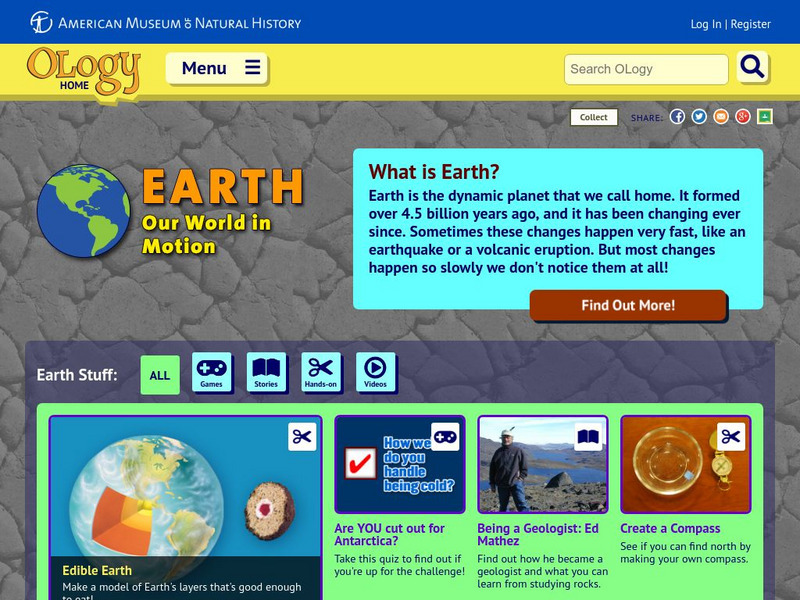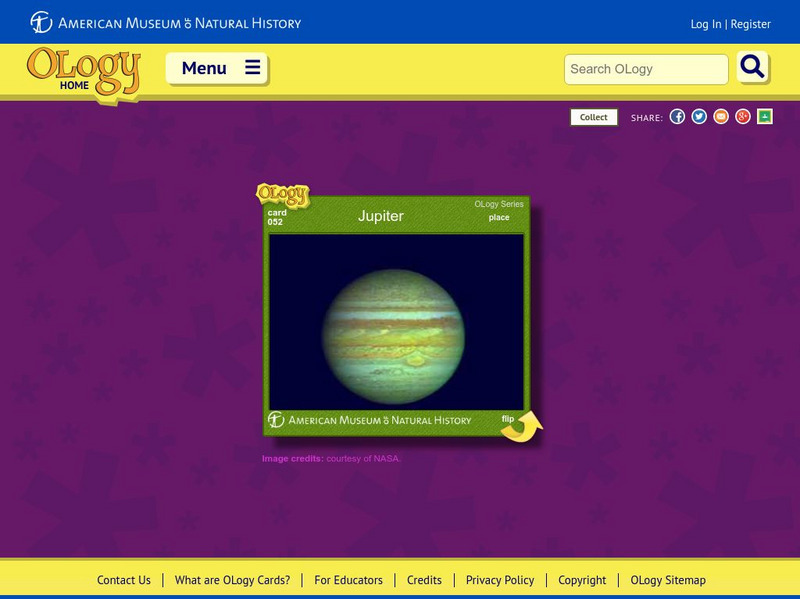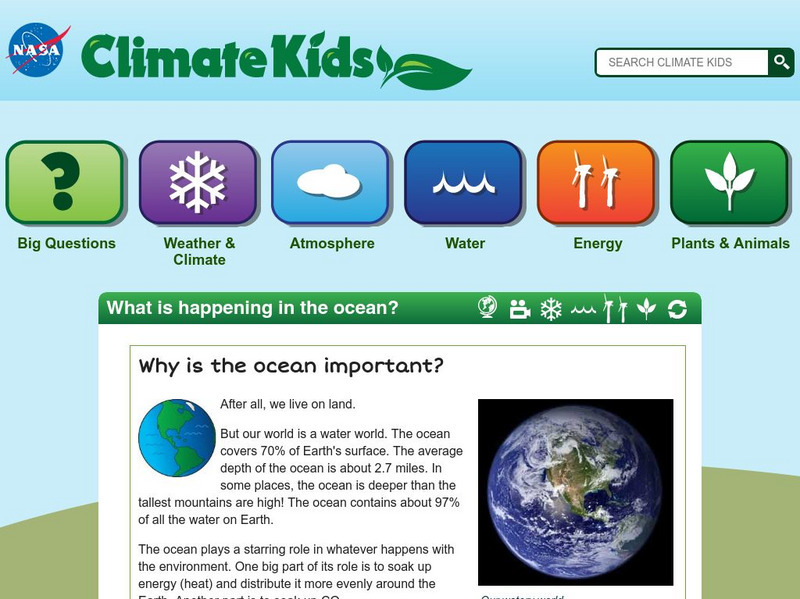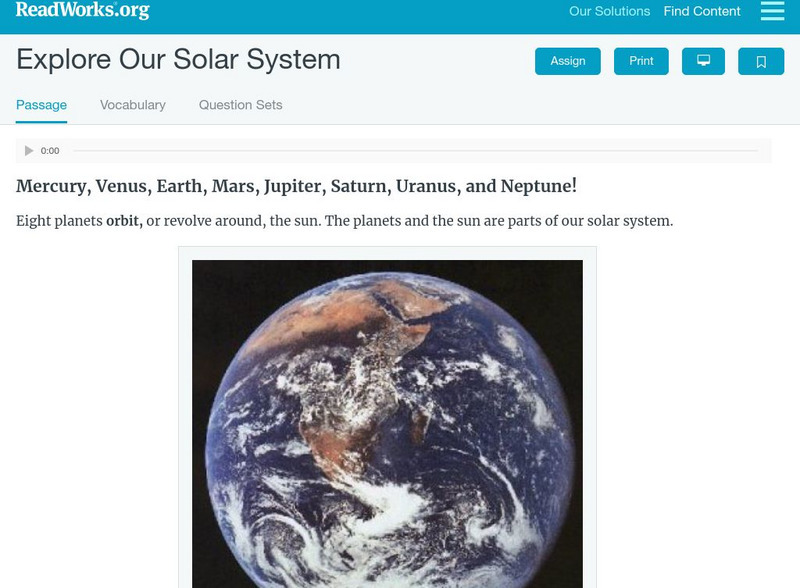Hi, what do you want to do?
Defenders of Wildlife
Defenders of Wildlife: Cheetah
Get the facts about cheetahs! What do they eat? Where do they live?
Enchanted Learning
Enchanted Learning: Neptune
A wealth of facts await you on this complete site. Topics include size, mass and gravity, length of day, orbit, distance from the sun, and more. A coloring page, quiz, fill-in-the-blanks activity, and interactive puzzle will challenge...
Enchanted Learning
Enchanted Learning: Uranus
This comprehensive site provides a wealth of information about the seventh planet from the sun. Topics include rotational axis, size, mass and gravity, length of day, distance from the sun, and more. The information is supplemented with...
NASA
Goddard Education: Eclipse 99
Information is provided about the eclipse of 1999; in addition, facts about elcipses throughout history are also included.
American Museum of Natural History
American Museum of Natural History: O Logy: Earth: Our World in Motion
This resource is a place for learning all about the Earth--the Earth's layers, its history, rocks and minerals, and interesting Earth science facts and discoveries. Explore, ask questions, find information, and meet American Museum of...
ClassFlow
Class Flow: What Happened to Pluto?
[Free Registration/Login Required] This flipchart was created to teach students about Pluto and the recent news of it NOT being a planet (officially). Lots of ways for students to vote on why as well as discussions about what other facts...
Science4Fun
Science4 Fun: Pluto
Learn fun facts and details about the atmosphere, geography, composition, and discovery of Pluto, a dwarf planet.
ClassFlow
Class Flow: Space Solar System
[Free Registration/Login Required] In this lesson students will compare and contrast the attributes of star, star patterns and planets. Students will also have the opportunity to review facts about each planet and then complete various...
Science4Fun
Science4 Fun: Mars
Learn fun facts and details about the weather, geography, composition, and discovery of Mars, the fourth closest planet to the Sun.
Science4Fun
Science4 Fun: Venus
Learn fun facts and details about the atmosphere, geography, composition, and discovery of Venus, the second closest planet to the sun.
ClassFlow
Class Flow: Multiplication Table
[Free Registration/Login Required] The teacher will use this lesson plan to review multiplication facts up to 10x10.
Science4Fun
Science4 Fun: Uranus
Learn fun facts and details about the atmosphere, composition, and discovery of Uranus, the seventh closest planet to the sun.
ClassFlow
Class Flow: Holiday Multiplication
[Free Registration/Login Required] Students will have a multiplication Christmas by reviewing multiplication fact families 2,3,4,5,and 10's through the magic wreath. By moving the wreath over the gifts, students will reveal the answer...
ClassFlow
Class Flow: Math Christmas
[Free Registration/Login Required] Students will have a multiplication Christmas by reviewing multiplication fact families 2, 3, 4, 5, and 10's through the magic wreath. By moving the wreath over the gifts, students will reveal the...
ClassFlow
Class Flow: Magic Math Squares
[Free Registration/Login Required] Students complete number sentences by inserting numbers in the correct order to arrive at a predetermined answer.
NASA
Nasa Star Child: Earth the Water Planet
Use this site to read about planet Earth. See a photo of the Earth from space, and learn quick facts about the earth's atmosphere, axis, and surface.
American Museum of Natural History
American Museum of Natural History: Jupiter O Logy Card
Flip this interactive card to start learning about Jupiter, the largest planet in our solar system. Answer multiple-choice and fact-or-fiction questions and review some fast facts about Jupiter.
Enchanted Learning
Enchanted Learning: Jupiter
This thorough site presents a wealth of facts about the fifth largest planet. Topics you will find discussed include size, mass and gravity, length of day, orbit, moons, and more. Various Jupiter activities are found on this site such as...
NASA
Nasa: Big Questions: Oceans
Learn more about the oceans that cover so much of our planet. Five big Q and A's are addressed including why oceans are so important, how oceans soak up energy and gases, the relationship between climate and oceans, and the function of...
Cosmos 4 kids
Cosmos4 Kids: Solar System: Pluto
Learn all about Pluto ..its discovery, basic facts, recognition as a planet, and most recently, its 'demotion' from a planet to a dwarf planet. The brief, to the point text makes this site most suitable for younger researchers.
Read Works
Read Works: Explore Our Solar System
[Free Registration/Login Required] This informational text passage shares facts about planets in the solar system. This passage is a stand-alone curricular piece that reinforces essential reading skills and strategies and establishes...
NASA
Nasa Space Place: All About Jupiter
Discover interesting facts about Jupiter, the biggest planet in our solar system.
CK-12 Foundation
Ck 12: Earth Science: Earth's Shape
[Free Registration/Login may be required to access all resource tools.] Examines Earth's shape.
CK-12 Foundation
Ck 12: Earth Science: Earth's Shape
[Free Registration/Login may be required to access all resource tools.] Examines Earth's shape.























